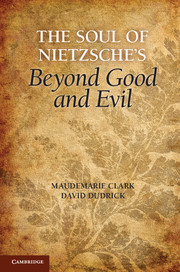Conclusion
Published online by Cambridge University Press: 05 August 2012
Summary
WHY DOES NIETZSCHE WRITE THE WAY HE DOES?
We end by offering some suggestions for answering the question from which we began: Why doesn’t Nietzsche write like a philosopher, laying out his views and giving arguments for them? Prompting this question was a lingering worry that this might reflect his attitude toward truth. Philosophers presumably write the way they do because they are in the business of figuring out and communicating the truth about their subject matter, and they think that setting out the argument – the ordered set of considerations in favor of the view they take to be true – is the best way to ensure success in doing so. Does Nietzsche’s refusal to write this way show that he rejects the importance of argument and therefore of truth? Our account of BGE One shows that this is far from the case, for reasons concerning both form and content.
Concerning form, BGE One is far from the loosely organized set of reflections that it appears to be. We have argued that it is written so that its true meaning becomes apparent only when one probes the text with questions and objections, attempting to figure out the logic of the passage, to see how it could be saying something that is true or at least plausible and that follows from considerations that it advances. Only someone who places a high value on both argument and truth could have written BGE, as we interpret it. Concerning content, we have argued that the sections of BGE One that seem to deny the value of pursuing truth and/or the possibility of attaining it (e.g., BGE 1–5) do so only on the exoteric level. When we follow Nietzsche’s instructions and learn to read him well, we find that he is denying neither. The “philosophy of the future,” the philosophy to which he is pointing and leading us in BGE, is designed to satisfy the will to truth. And, as the kind of neo-Kantian naturalism we have argued that it is, it is certainly a philosophy in the traditional sense. We therefore see ourselves as having provided evidence against Bernard Williams’s (1994: 238) well-known claim that Nietzsche’s text is booby-trapped, not only against recovering theory from it but, in many cases, against any systematic exegesis that assimilates it to theory. We agree, of course, if he means simply that Nietzsche’s text is booby-trapped against easy recovery of theory, against being able to read a philosophical theory off of its surface. Our interpretation can then be taken to add support to Williams’s claim. But if Williams meant that nothing resembling a philosophical theory can be extracted from Nietzsche’s work, our work provides significant evidence against his claim.
- Type
- Chapter
- Information
- The Soul of Nietzsche's Beyond Good and Evil , pp. 245 - 264Publisher: Cambridge University PressPrint publication year: 2012

